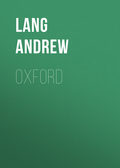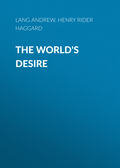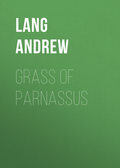
Lang Andrew
He
CHAPTER VIII.
HE
Next day Leonora was suffering from a slight feverish cold, and I don't wonder at it considering what we suffered in the Zû. I therefore went alone to the rendezvous where I was to meet 'our representative.'
To my surprise, nobody was there but old Pellmelli himself.
'Why, you said you would send your representative!' I exclaimed.
'We are our usual representative,' he answered rather sulkily. 'Come on, for we have to call on Messrs. Apples, the famous advertisers.'
'Why?' said I.
'Can you ask?' he replied. 'Can aught be more interesting than an advertiser?'
'I call it log rolling,' I answered; but he was silent.
He went at a great pace, and presently, in a somewhat sordid street, pointed his finger silently to an object over a door.
It was the carven head of an Ethiopian!
This new confirmation of the prophecy gave me quite a turn, especially when I read the characters inscribed beneath —
Try our Fine Negro's Head!
'Here dwells the sorcerer, even Asher,' said Pellmelli, and began to crawl upstairs on his hands and knees.
'Why do you do that?' I asked, determined, if I must follow Pellmelli, at all events not to follow his example.
'It is the manner of the tribe of Interviewers, my daughter. Ours is a blessed task, yet must we feign humility, or the savage people kick us and drive us forth with our garments rent.'
He now humbly tapped at a door, and a strange voice cried,
'Entrez!'
Pellmelli (whose Russian is his strong point) paused in doubt, but I explained that the word was French for 'come in.'
He crawled in on his stomach, while I followed him erect, and we found ourselves before a strange kind of tent. It had four posts, and a broidered veil was drawn all round it.
Within the veil the sorcerer was concealed, and he asked in a gruff tone,
'Wadyerwant?'
Pellmelli explained that he had come to receive a brief personal statement for the Budget.
The Voice replied, without hesitation, 'The Centuries and the Æons pass, and I too make the pass. Je saute la coupe,' he added, in a foreign tongue. 'While thy race wore naught but a little blue paint, I dwelt among the forgotten peoples. The Red Sea knows me, and the Nile has turned scarlet at my words. I am Khoot Hoomi, I am also the Chela of the Mountain!'
'Now it is my turn to ask you a few easy questions.
'Who sitteth on the throne of Hokey, Pokey, Winky Wum, the Monarch of the Anthropophagi?
'Have the Jews yet come to their land, or have the owners of the land gone to the Jews?
'Doth Darius the Mede yet rule, or hath his kingdom passed to the Bassarids?'
As Pellmelli was utterly floored by these inquiries (which indicated that the sorcerer had been for a considerable time out of the range of the daily papers), I answered them as well as I could.
When his very natural curiosity had been satisfied by a course of Mangnall's Questions, I ventured to broach my own business.
He said he did not deal in mummies himself, though he had a stuffed crocodile very much at my service; but would I call to-morrow, and bring Leonora? He added that he had known of our coming by virtue of his secret art of divination. 'And thyself,' he added, 'shalt gaze without extra charge in the Fountain of Knowledge.'
Thrusting a withered yellow hand out of the mystic tent, he pointed to a table where stood a small circular dish or cup of white earthenware, containing some brown milky liquid.
'Gaze therein!' said the sorcerer.
I gazed —There was a Stranger in the tea!
Deeply impressed with the belief (laugh at it if you will) that I was in the presence of a being of more than mortal endowments, I was withdrawing, when my glance fell on his weird familiars, – two tailless cats. This prodigy made me shudder, and I said, in tones of the deepest awe and sympathy, 'Poor puss!'
'Yes,' came the strange voice from within the tent, 'they are born without tails. I bred them so; it hath taken many centuries and much trouble, but at last I have triumphed. Once, too, I reared a breed of dogs with two tails, but after a while they became a proverb for pride; Nature loathed them, and they perished. Χαιρε! Vale!'22
This, though not understood, of course, by Pellmelli, was as good as an invitation to withdraw, so I induced the old man to come away, promising the magician I would return on the morrow.
Who was this awful man, to whom centuries were as moments, whose very correspondence, as I had noticed, came through the Dead Letter Office, and who spoke in the tongues of the dead past?
CHAPTER IX.
THE POWER OF HE
Next day Leonora, the Boshman, and I returned to the home of the mage. He stood before us, a tall thin figure enwrapped in yellowish, strange garments, of a singular and perfumed character – spicy in fact – which produced upon me a feeling which I cannot attempt to describe, and which I can only vaguely hint at by saying that the whole form conveyed to me the notion of something wrapped up.23
With a curious swaying motion which I have never seen anything like – for he seemed less to be walking than to be impelled from behind like a perambulator, or dragged from in front like a canal-boat – he advanced to the table, where lay some pieces of a white substance like papyrus, all of the same size and oblong shape, which showed on their surfaces, some of them antique-looking figures and faces curiously stained, and others red and black dots, arranged, as it seemed to me, in some sort of design, although at first sight they looked jumbled enough. Near to these lay a book bound in brown, but with heavy black and gold lettering, amid which I thought I could make out the words Modern Magic, and the name Hoffmann. The swathed figure poised itself a moment, resting one thin hand on the table, and then spoke.
'There is naught that is wonderful about this matter,' it said, 'could you but understand it. Prestigiation itself is wonderful, but that its phases and phrases should be changed is not wonderful. Not now, I ween, is the gibecière of the Ancient Wizard seen; not now the "Presto, pass!" of the less ancient conjurer heard. Nay, all things change, yet I change not; that which is not yet cannot yet have taken place – at least not its proper place; that which shall not be may yet come to a bad pass, and the blind race of man watches helpless the trammels it could shake off did it but greatly dare. My business, ladies and gentlemen, now is, as I have just explained to you, to attempt to puzzle your eyes by the quickness of my fingers. Yours, on the other hand, will be to detect the way – or modus operandi, as old Simon Magus used to say – in which I perform my little wonders – if you can. Will any gentleman lend me a helmet – I mean a hat?'
As the only male person present was the Boshman, this appeared to me a futile question, and even the stately Magician seemed to be struck by some dim idea of the kind, for I could discern a pair of mysterious eyes peering anxiously through his swathings, and I heard him mutter to himself in several languages, 'Ought to have thought of that. No hat present. Don't know any trick to produce one. Nothing about it in the book.'
But he recovered himself quickly, and went on in clear cheerful tones, 'Ladies and gentlemen, as no person present has a hat, I will proceed to another of the tricks on my little programme. Will any lady oblige me by drawing a card? Will you, madam?' he said, bowing with infinite grace to Leonora.
Her hand touched Asher's as she drew a card, and I saw a shiver pass over the veiled figure.
'Will the lady on your left now oblige me?' he continued, turning to me, who was indeed standing on Leonora's left hand, though how he knew it is a thing I have never been able fully to understand.
'Now, please,' he continued, 'look well at your cards, but do not show them to me or to each other. Basta. Assez. Κογξ Ομπαξ. Now, please, still hiding the cards from me and from each other, exchange them. Now,' he continued, his form dilating with conscious power, 'see how true is it that change is perennial, even so far as magic and Nature herself can be perennial. For she who held the King of Hearts now holds the Queen of Spades, and she who held the Queen of Spades now holds the King of Hearts. Thus much among the shifting shadows of life can I, the wizard, see as a sure and accomplished fact. Is it not so, my children?'
We bowed in silence, overawed by the wonder of his presence, although Leonora whispered to me, 'He has got the cards wrong, but we had better say nothing about it.'
'And now,' he continued, 'look upon this glass (it was an ordinary wineglass) and on this silver coin,' producing a stater of the Eretrian Republic. 'See! I place the coin in the glass, and now can I tell you by its means what you will of the future. There is no magic in it, only a little knowledge of the secrets, mutable yet immutable, of Nature. And this is an old secret. I did not find it. It was known of yore in Atlantis and in Chichimec, in Ur and in Lycosura. Even now the rude Boshmen keep up the tradition among their medicine-men. Vill any lady ask the coin a qvestion?' he continued, in a hoarse Semitic whisper, for all currencies and all languages were alike to him. 'Sure it's the coin 'll be afther tellun' ye what ye like. Voulez-vous demander, Mademoiselle? Wollen Sie, gnädige Signora?'
'Then,' said Leonora, in trembling accents, 'I demand to know if I shall find that which I seek.'
The figure, drawing itself up to its full height, passed its hand with a proud, impatient, and mystic gesture across the glass, and then stood in the attitude of one who awaited a response. 'Should the coin, my daughter, jump three times,' he said, 'the answer is yea. Should it jump but once, nay.'
We waited anxiously. The coin did not jump at all! The wizard took up the glass, shook it impatiently, and put it down again. Still the coin showed no sign of animation. Then the wizard uttered some private ejaculations in Hittite, but still the coin did not move. Then he affected an air of jauntiness, and said, 'I remember a circumstance of a similar kind when I was playing odd man out (τριος ανθρωπος dear old Sokrates used to call it) with Darius the night before Marathon. Darius was the Mede. I was the Medium.' Then he seemed about to work another wonder, when he was interrupted by the harsh cackling laughter of the Boshman, who advanced with careless defiance and observed in his own tongue, which we all knew perfectly, that he 'could see all the tricks the wizard could do and go several better.' I waited, horror-struck, to see what would follow this insolence.
Asher made a movement so swift that I could scarcely follow it; but it seemed to me that he lightly laid his hand upon the poor Boshman's head. I looked at Ustâni, and then staggered back in wonder, for there upon his snowy hair, right across the wool-white tresses, were five finger-marks black as coal.
'Now go and stand in the corner,' said the magician, in a cold inhuman voice. The unhappy Boshman tremblingly did his bidding, putting his hands to his head in a dazed way as he went, and, incredible as it may seem, thus transferring – as if the curse carried double force – some of the black mark to his own fingers.
'I will now,' continued the wizard, who had regained his ordinary polished, if somewhat swaying and overbalanced, manner – 'I will now, with your kind permission, show you a little trick which was a great favourite with the late Tubal Cain when we were boys together. Observe, I take this paper-knife – it is an ordinary paper-knife – look at it for yourselves. I will place it on my down-turned hand. It is an ordinary hand – look at it for yourselves, but don't touch it; the consequences might be disastrous.'
I, for my part, having seen the consequences in the case of Ustâni's hair, had no desire to do so.
'You see,' continued the sorcerer, 'I place the paper-knife there! It falls. Why? Because of gravity. What is gravity? Newton, as you know well, invented the art; but what of that? Did he find that which did not exist? No, for the non-existent is as though it had never been. But now, availing myself of the resources of science, which is ever old and ever young, I clasp my wrist – the wrist of the hand on which the paper-knife rests – with the other hand, and – you see.'
As the sorcerer spoke, he deftly turned his hand palm downwards, and the paper-knife fell with a crash and a clatter on the floor. It was terrible to see the dumb wrath of the swathed figure at this new defeat.
Even in this moment the Boshman glided like a serpent among us, picked up the paper-knife, and triumphantly performed the very miracle in which the wizard had failed. A harsh cackle of laughter announced his success. But the mage was even with him, or rather he was 'odds and evens.' Rapidly he drew his forefinger across the Boshman's face, perpendicularly and horizontally —

On the skin of Ustâni, azure with terror, appeared the above diagram in lines of white! The mage then made the sign of a +, thus —

and challenged Leonora to a contest of skill in 'oughts and crosses.' But the Boshman, catching a view of his own altered aspect in a mirror, exclaimed, 'You 'standy Ustâni? Him no standy He! Him show hisself for tin! Adults one shilling, kids tizzy. Me Umslopoguey!' And he sloped; nor did we ever again see this victim of an overwhelming Power (limited).
We presently took our leave of the mage, promising to call next day, and bring a policeman.






